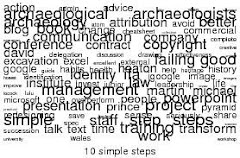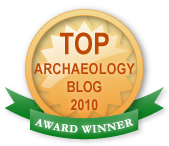Here is the Powerpoint I will be talking through next week at the Annual Conference for Archaeologists in Swansea as part of the Managing Archaeology session sponsored by English Heritage.
Wednesday 12 March 2008
IFA conference presentation
Posted by
Martin Locock
at
21:09
0
comments
![]()
Labels: admin, communication, steps
Tuesday 11 March 2008
Why do good Project Officers make bad Project Managers?
In my Redesigning the pyramid paper I argued that the role of Project Officer was the hardest job in archaeology, owing to the punishing combination of archaeological, supervisory, administrative, legal, and managerial responsibilities, combined with stress, travel, isolation and weather. That is still true, and therefore the aim of the parent organisation should be provide all possible support to assist them.
You might think that somebody who can cope successfully with the Project Officer role would therefore be well-equipped to take on a managerial role with a significant office-based element to the work. It doesn't seem to work that way: often they find the role unrewarding, difficult, tedious, and even more stressful. Partly this may be because the Project Officer has been impelled upwards by a desire for job security, money or status, rather than a desire to become a manager as such. But partly it may be because being a Project Officer is an apprenticeship that teaches some unhelpful lessons.
The Myers-Briggs personality Type Indicator is a widely-used tool to identify the different approaches that people have towards life in general and work in particuler. It has been criticised but remains in use mainly because it is simple and is felt to reflect some real differences within the workforce.
I have devised the following exercise with a similar intent. below are listed a series of pairs of concepts, and you should choose one from each pair that you prefer on the grounds that it is important or easy or something you handle well.
List A < = > List B
Improvisation < = > Planning
Pragmatic < = > Principled
Short-term < = > Long-term
Completion < = > Sustainability
Risk tolerant < = > Risk averse
Innovation < = > Maintenance
Flexible < = > Programmed
If you have a background in successful project work, you are likely to have chosen answer A in most or all cases; the B answers sound at best irrelevant and sometimes actively negative. This is a natural result of the tunnel vision that project work encourages: focus on delivering the key targets to the exclusion of all else is (in that context) exactly what is required. But managers are expected to take a broader view: there are times when a project has to take a hit for the benefit of the organisation a a whole. Improvisational responses may, with the side-effect of exhaustion and panic, deliver successful management, but in the long term (aha!) a more structured and considered planned approach is needed. It is sometimes said that the job of managers is to tell their staff things they don't want to hear; there will be a tension between the managers' priorities and those of others. The conflict between 'site' and 'HQ' that seems an unavoidable part of archaeology reflects this: the Project Officer will want three more days to finish sampling, while being told to close the site so the team can move on to the next site and the invoices can go in.
So part of becoming a manager involves re-orientating your attitudes towards the interests of the organisation as a whole rather than your team and your projects. It is hardly surprising that this takes time: some senior managers never quite get there
Posted by
Martin Locock
at
21:19
1 comments
![]()
Wednesday 5 March 2008
Annotated book list
A Manager's Guide to Self Development by Mike Pedler, John Burgoyne, and Tom Boydell
Buy it from Amazon
Primers on a wide range of activities and tools, framed within a programme of self assessment and review. Although the chapters contain example exercises, the further reading recommended will be needed to pursue a topic in earnest; it is an excellent way to get a feel for the issues as an introduction.
The Definitive Book of Body Language by Allan Pease and Barbara Pease
Buy it from Amazon
Although presented in a chatty and populist format, this contains a lot of interesting insights into non-verbal communication. Many of their explanations for the origins of behaviour are derived from simplistic evolutionary and sociobiological determinism, but this does not devalue their observation and analysis.
Getting Things Done by David Allen
Buy it from Amazon
Discussed elsewhere: but in summary, well worth buying. I have carried it around with me for months, telling anyone who'll listen about the almost magical powers of the Two Minute Rule (if something takes less than 2 minutes, do it straight away; if not, put it on the list), the Waiting For list (tasks which you can take no action on until someone else does something, and which, therefore, there is no point you thinking about), Next Actions (listing not a big nebulous project like 'buy a house' but the immediate next step, like 'go to an estate agent'), and Agendas (places to note down things you need to say to people when you think of them). It really will change your life, leaving your mind clear to think and your time free to do stuff, not organise stuff.
[fuller review here]
The One Minute Manager by Kenneth Blanchard and Spencer Johnson
Buy it from Amazon
Simple, painless to read advice intended mainly for people managers in offices. The three secrets of the One Minute Manager are setting and agreeing goals, praising good performance, and reprimanding poor performance, within the context of a one minute conversation. A good reminder that leaving people to get on with their work is not the best approach.
Managing Archaeology edited by M A Cooper, A Firth, J Carman and D Wheatley
Buy it from Amazon
Collected papers from sessions on management and archaeology from the TAG 1992 and IFA 1993 conferences. Includes case studies from English Heritage, MOLAS and GGAT, but half the volume is concerned with archaeological resource management and related issues, so there is less emphasis on project management than might be expected.
... and finally
 10 simple steps to better archaeological management by Martin Locock
10 simple steps to better archaeological management by Martin Locock
The book of the blog: details here.
Posted by
Martin Locock
at
12:46
0
comments
![]()







